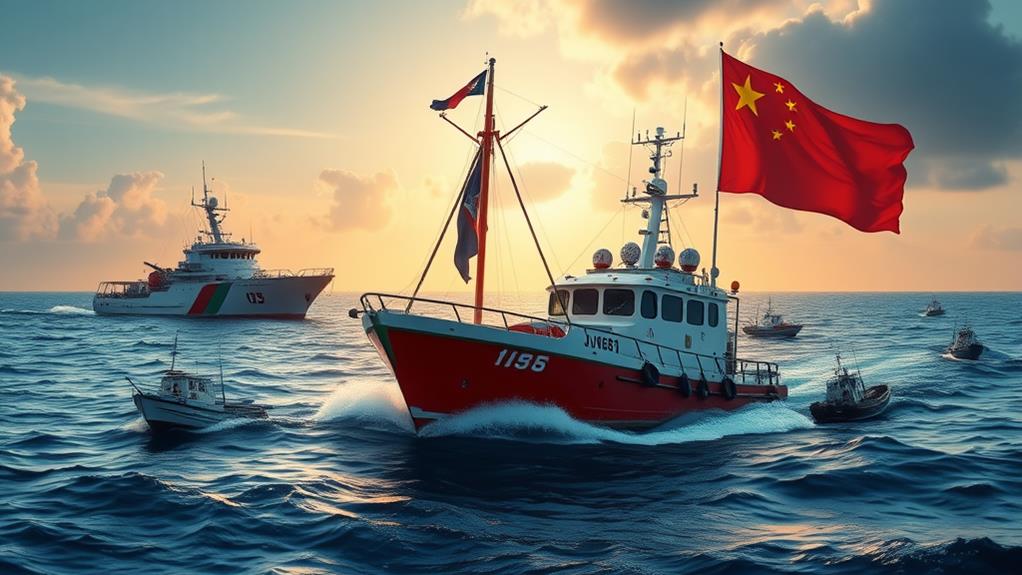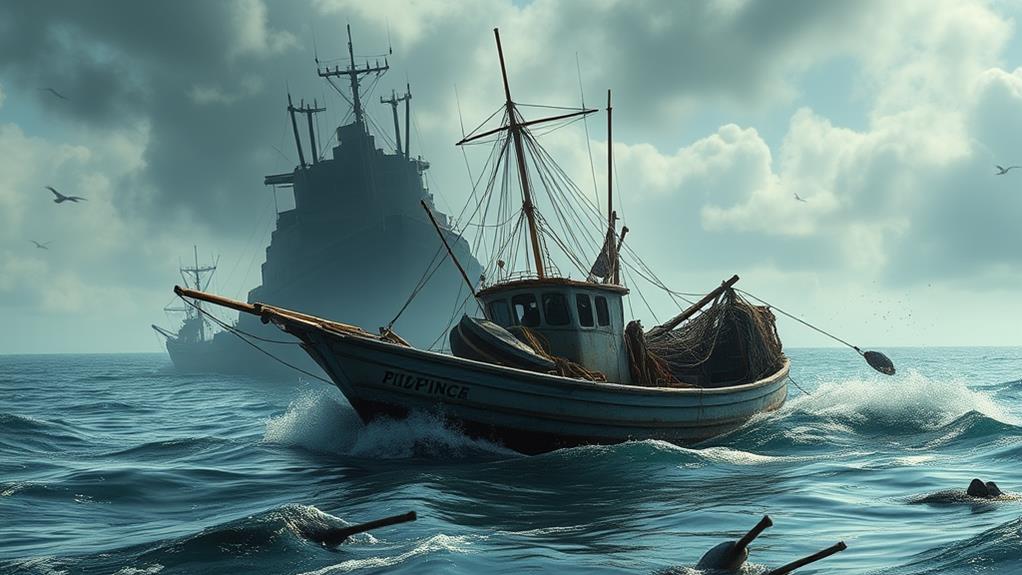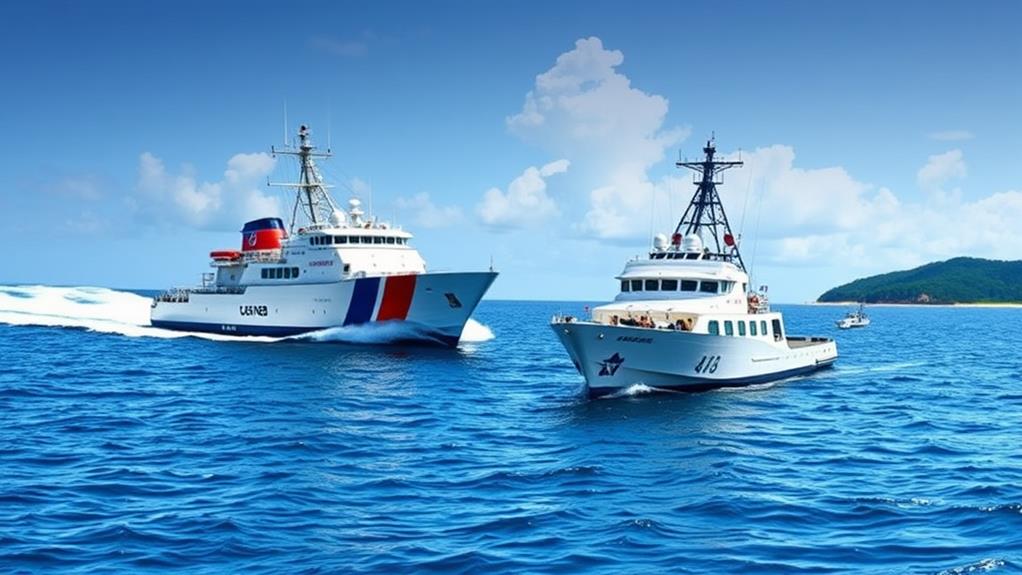Piracy and illegal fishing threaten the Philippines' maritime security. These crimes disrupt trade, endanger seafarers, and deplete fish stocks, causing significant economic and environmental harm.
Piracy attacks on ships and oil platforms have increased in recent years, with the Sulu Sea being a hotspot. Meanwhile, illegal fishing depletes the country's fish stocks, damaging marine habitats and affecting the livelihoods of local fishermen.
These crimes are linked to transnational organized crimes, such as drug trafficking and human trafficking.
Poverty and weak governance in certain regions create an environment conducive to these illegal activities.
To combat these threats, the Philippines needs to improve interagency coordination and leverage international partnerships. This can be achieved by streamlining agency roles and enhancing maritime law enforcement.
A cohesive national strategy is crucial to address these challenges. The Philippine government must develop and implement effective policies to protect its maritime domain and combat piracy and illegal fishing.
International cooperation and capacity-building programs can also help strengthen the country's maritime security capabilities.
Maritime Threats Overview

Maritime Security in the Philippines: Piracy and Illegal Fishing
Maritime Threats Overview
The Philippines faces several maritime threats that compromise its territorial integrity, economic stability, and environmental sustainability.
As an archipelagic nation, the country's maritime security is vulnerable to various challenges.
Overfishing and Illegal Fishing
Illegal fishing practices deplete vital fish stocks and threaten local ecosystems. For instance, the endangered ludong, a unique species found only in the Philippines, is threatened by overfishing.
This issue is further complicated by China's occupation of key features in the West Philippine Sea, such as the Scarborough Shoal, which has reduced fish stocks available to Filipino fishermen.
As a result, local fishermen are driven to engage in illicit activities.
Piracy, Terrorism, and Smuggling
The Sulu Archipelago is a hotbed for piracy, terrorism, and smuggling activities. Violent extremist organizations (VEOs) and smuggling groups take advantage of the archipelago's strategic location between the Celebes and Sulu Seas.
These activities pose significant challenges to maritime security.
Additional Threats
Maritime pollution, human trafficking, and incursions by foreign vessels further complicate the security landscape. The lack of effective governance structures, with overlapping roles and mandates among law enforcement agencies, exacerbates these threats.
Understanding these challenges is crucial for developing effective strategies to protect the Philippines' maritime interests and ensure coastal community security.
Piracy and Transnational Crimes
The Philippines' Maritime Domain: A Hotbed of Piracy and Transnational Crimes
The Philippines' maritime domain is a hotspot for piracy and transnational crimes, posing significant threats to national security and economic stability.
Piracy and Armed Robbery: Endangering Lives and Disrupting Trade
Maritime piracy and armed robbery have long plagued the country's coastal waters, particularly around the busy shipping lanes of the South China Sea.
These crimes endanger the lives of seafarers and disrupt trade, leading to increased insurance premiums and financial losses for maritime businesses. Weak governance and inadequate law enforcement in some areas exacerbate the problem, making the Philippines a prime target for criminals.
Far-Reaching Economic Implications
Piracy and armed robbery can have far-reaching economic implications, affecting investment, tourism, and employment opportunities in the Philippines. These crimes disrupt trade, leading to financial losses and increased insurance premiums, which can have a ripple effect on the economy.
Interlinked Transnational Crimes
Other transnational crimes, such as drug trafficking, human trafficking, and IUU fishing, also thrive in the Philippines' waters.
These activities are often interlinked, with poverty and fragmented maritime governance contributing to their persistence.
Combatting Piracy and Transnational Crimes
Effective combat against these crimes requires addressing root causes, strengthening law enforcement, and enhancing international cooperation. This includes addressing poverty and improving governance to prevent the persistence of these crimes.
Impact of Illegal Fishing

Illegal Fishing: A Triple Threat to the Philippines
Illegal fishing has been devastating the Philippines' marine ecosystems, causing a decline in fish stocks, destruction of habitats, and food security threats. This issue affects not only the environment but also the economy and national security.
Depleting Fish Stocks
The depletion of fish stocks has a direct impact on the income of local fishermen.
Reduced income for local fishermen is a consequence of illegal fishing, as it diminishes their catch and makes it harder for them to sustain their livelihoods.
Damaging Marine Habitats
Illegal fishing also results in destruction of coral reefs and marine life.
This damage to marine habitats affects the delicate balance of the ecosystem, further threatening the survival of fish populations.
Threatening Food Security
The depletion of fish stocks has a ripple effect on the nation's food security.
Decreased fish supply, impacting national food security is a consequence of illegal fishing, as fish is a primary food source for many Filipinos.
Combating Illegal Fishing
International cooperation is essential in addressing this issue.
The Philippines has been working with neighboring countries, such as Indonesia and Malaysia, to conduct coordinated patrols in the Sulu and Celebes seas.
However, more needs to be done to strengthen maritime law enforcement and protect the country's marine resources effectively.
Fragmented Maritime Governance
Maritime Governance Challenges in the Philippines
In the Philippines, multiple maritime law enforcement agencies with overlapping roles and responsibilities create a complex governance system, hindering effective coordination and action. The Navy, Coast Guard, National Police Maritime Group, and National Coast Watch Center (NCWC) are the core institutions involved in maritime security, but they often encounter complications due to unclear mandates and roles.
Historically, the Pasig River, a vital trade route, required effective governance for economic activities and communication. This highlights the importance of cohesive management in maritime contexts, as it facilitated the exchange of goods and cultural identity in the Philippines.
The fragmentation of governance leads to a lack of transparency and tension between agencies, as they compete for resources. For example, the Navy and Coast Guard, separated in 1998, compete for funding and assets.
Despite these challenges, there have been efforts to enhance coordination. The NCWC, established in 2015, serves as a focal point for interagency coordination, although it lacks command potential.
A clear national maritime strategy is essential to address these issues. This strategy would need to define the problems and priorities of the Philippines' maritime security and delineate the roles of each agency, helping to overcome the current obstacles to effective coordination.
Such a strategy would align with the broader national security policy, ensuring a cohesive and efficient approach to managing the country's extensive maritime interests.
How Does the South China Sea Dispute Impact Maritime Security in the Philippines?
The South China Sea dispute significantly impacts maritime security in the Philippines. The ongoing tension over the philippines territorial claims in the region has raised concerns about the safety of shipping lanes and the potential for conflict. The Philippines is closely monitoring the situation to safeguard its maritime interests.
Enhancing Maritime Security Coordination

Enhancing Maritime Security Coordination in the Philippines
To ensure effective maritime security coordination in the Philippines, it's essential to streamline the roles and responsibilities of various law enforcement agencies. This involves adopting a whole-of-government approach, as emphasized by recent policy changes and executive orders.
Key Agencies and Their Roles in Maritime Security Coordination
The National Maritime Council (NMC) formulates policies and strategies for maritime security. The Armed Forces of the Philippines is responsible for territorial defense operations and supports the NMC.
The Philippine Navy handles maritime law enforcement and naval defense operations, while the Philippine Coast Guard (PCG) focuses on policing and patrolling maritime areas. The Philippine National Police provides support in maritime law enforcement.
Benefits of Coordination
This restructuring ensures that agencies work together to address maritime threats like piracy, smuggling, and territorial disputes.
Joint training exercises with international partners, such as the U.S., enhance interagency coordination and improve maritime domain awareness. These efforts are critical to maintaining the country's territorial integrity and maritime security.
International Cooperation and Diplomacy
International Cooperation and Diplomacy in the South China Sea
Strengthening Maritime Security through Cooperation
To navigate the complex geopolitical landscape of the South China Sea, the Philippines is bolstering international cooperation and diplomacy.
The country is working with the European Union to establish a subcommittee on maritime cooperation, focusing on ocean governance, the blue economy, and security issues. This partnership emphasizes the importance of respecting sovereignty, sovereign rights, and jurisdiction in accordance with international law, particularly the 1982 UN Convention on the Law of the Sea (UNCLOS).
Regional Partnerships and Cooperative Efforts
The Philippines is also engaging with other regional actors, such as Taiwan.
Despite overlapping sovereignty claims, Taiwan and the Philippines are exploring joint coast guard patrols and information sharing to counter China's assertive maritime activities. Additionally, the Philippines is seeking support from partner states like the United States and multilateral groups like the Quad to enhance its maritime capacity and address transnational threats like piracy and illegal fishing.
Commitment to a Rules-Based International Order
These cooperative efforts demonstrate the Philippines' commitment to a rules-based international order and its determination to secure its maritime interests through diplomacy and cooperation.
By working together with other nations, the Philippines aims to protect its vital waterways for trade and security, while respecting the sovereignty and jurisdiction of all nations involved.
Questions and Answers
How Do Local Communities Benefit From Enhanced Maritime Security?
Enhanced maritime security boosts local economies and improves daily life. It ensures safe and legitimate maritime activities, such as fishing and tourism, which are crucial for local economies. For example, in coastal towns, fishing industries can thrive, providing jobs and income for local families.
Additionally, tourism can flourish, attracting visitors who support local businesses and contribute to the community's prosperity.
Better governance and law enforcement reduce threats to local communities. They minimize dangers like piracy and smuggling, making it safer for residents to access goods and services. This, in turn, enhances food security, as local markets receive a steady supply of goods, including fresh produce and other essentials.
Environmental protection is also a key benefit of enhanced maritime security. It helps preserve vital marine resources, such as coral reefs and fisheries, which are essential for the long-term health of the ocean and the community's well-being.
What Role Does Education Play in Maritime Security Awareness?
Education is vital for maritime security awareness as it provides individuals with the necessary knowledge and skills to identify and mitigate security risks.
Through training programs, individuals learn to recognize security threats, such as unauthorized access to vessels or cargo, and understand security protocols, like screening procedures and access control.
This education enables them to respond effectively to emergencies, such as hijacking or piracy incidents.
Furthermore, it fosters a culture of security consciousness, ensuring compliance with international standards and encouraging proactive measures to prevent security breaches.
How Do Environmental Degradation and Maritime Security Intersect?
Environmental degradation and maritime security are closely linked. Environmental degradation, such as climate change, marine pollution, and resource exploitation, can have a direct impact on maritime security. For instance, climate change can alter trade routes, forcing ships to take longer routes and increasing the risk of pirate attacks.
Marine pollution can also lead to increased competition for resources, as fishermen and other stakeholders compete for access to dwindling fish stocks, leading to social unrest and conflict.
Environmental degradation can also escalate geopolitical tensions over resources. For example, disputes over fishing grounds can lead to conflict between neighboring countries, as seen in the South China Sea.
Competition for oil and gas resources can also lead to tensions between nations, as seen in the Arctic region.
Coastal communities are often the most affected by environmental degradation and maritime insecurity. Social unrest and competition for limited resources can lead to increased migration and human trafficking, further complicating maritime governance and security efforts.
Understanding the intersection of environmental degradation and maritime security is crucial for developing effective strategies to address these complex issues.
What Is the Economic Impact of Maritime Piracy on Local Industries?
Maritime piracy has a devastating impact on local industries. It leads to increased operational costs, which can make local shipping companies less competitive. For instance, higher insurance premiums and security costs are inevitable consequences of piracy.
This, in turn, affects the overall economy of regions dependent on maritime trade.
Piracy disrupts supply chains, causing uncertainty and inflationary pressures. As a result, consumer prices rise, ultimately stifling economic growth.
Fishing and tourism industries are also severely impacted, leading to reduced revenues and economic uncertainty.
How Can Private Sector Entities Support Maritime Security Efforts?
Private Sector Entities Can Support Maritime Security Efforts
Private sector entities can play a crucial role in supporting maritime security efforts by investing in advanced surveillance technologies.
These technologies can monitor high-risk areas, providing real-time intelligence to identify potential threats. For instance, advanced radar systems and satellite imaging can track suspicious vessels and detect anomalies in maritime traffic.
Partnering with Naval Authorities is Key
Partnering with naval authorities is essential to share intelligence and best practices.
This collaboration enables the sharing of critical information, such as pirate attack patterns and modus operandi, to enhance security protocols. By working together, private sector entities and naval authorities can develop effective strategies to combat piracy.
Implementing Stringent Security Protocols
Implementing stringent security protocols on vessels can deter pirate activities.
Armed guards, secure communication systems, and robust access controls can prevent pirates from boarding and hijacking vessels. Moreover, these protocols can also help to detect and respond to potential threats more effectively.
Advocating for Policy Changes
Advocating for policy changes that address the economic drivers of piracy can help alleviate the root causes.
For example, supporting initiatives that promote economic development and job creation in coastal regions can reduce the incentive for individuals to engage in piracy. By addressing the underlying causes of piracy, private sector entities can contribute to a safer and more secure maritime environment.